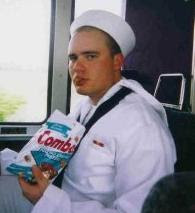Tallahassee Democrat, May 21, 2007Gun control: The juvenile and pointless debate continuesBy Adam WeinsteinMy father is a gun nut. He collects them, new ones and old ones, and he derives unfathomable glee from shooting, cleaning and studying them. Thanks to him, I can field-strip an M-16, shoot a Winchester '86 and tell the difference between a matchlock and a flintlock.
But when I turned 21 and applied for a Florida carry permit like Dad's, he didn't do cartwheels or take me window shopping for a double-action hand cannon. His only acknowledgment was to take me out to the side of a road and pull me down beside the remnants of a recently flattened possum.
"Dead," Dad intoned, "is dead. No replays, no extra lives, no do-overs. Just like this road kill."
This was not mere eccentricity on my pop's part. He wanted me to acknowledge a simple truth: Guns are lethal instruments, and they are not for everybody. Not long after, I decided that, except for an occasional weekend trip to the range, guns were not for me.
All of which makes it hard for me to understand why, even after a heartbreak like the one at Virginia Tech last month, the debate over gun control remains as juvenile and pointless as ever.
On one hand, you have the National Rifle Association claiming to speak for all gun owners. Apparently, though, its constituency doesn't include my family of gun owners, since we believe in more rigorous background checks, gun traces, and limits on the ownership of watermelon-exploding .50-caliber Barrett sniper's rifles.
On the other hand, you have one-note liberal groups like the Brady Campaign and the American Civil Liberties Union, who consider gun ownership too insidious to deserve the same protections afforded free speech or due process.
Lost in the middle, I fear, are gun owners like my father - and other middle-of-the-road citizens - who appreciate the right of self-defense, but want it to come with greater responsibilities. In the marketplace of ideas, gun-policy moderates don't even rate a kiosk.
Why is it so hard to reach reasonable compromises on gun ownership?
One scholar has an answer. Gary Kleck, a criminology professor at FSU, spent the last three decades researching the relationship between guns and violence in America. But his latest research focuses on the gun debate itself.
Its conclusion: The dialogue on gun rights has been hijacked and slickly packaged by self-styled culture warriors. Rather than weighing evidence, these factions encourage citizens like you to take cues from your membership in an in-group.
"People support gun control," Kleck says, "because they're in the cultural groups that are hostile to gun owners." The data suggest that those groups include Northerners, Jews and Catholics, women and the upper middle classes. Among their members, the gun debate isn't about assault weapons, mental-health checks or Teflon bullets: It's about the senselessness of gun ownership in their worldview, period.
Women, in particular, are likely to see "alleged defensive gun use as fraudulent," Kleck says, where men are more likely to approach guns as "useful tools." Likewise, the data show Southerners, Protestants and the economically depressed are probably pro-guns - more due to tradition than reason.
Kleck maintains that the culture clash in gun policy is especially obvious in his workplace, the ivory tower. Academic researchers fit the cultural mold of anti-gun Americans. Consequently, he says, "Many will say, 'We don't care how many surveys have been done (that are) inherently in favor of self-defense as a justification.' Facts don't affect your cultural animosities."
That's a shame, because the facts in his earlier studies provide food for thought. Guns, he concluded, are "instruments that have the same impact on aggression and defense. In both cases," he says, "they empower the possessor." In other words, guns make crime easier - but they also make self-defense easier.
Could it be possible that pro-gunners and anti-gunners are both right? Absolutely. There's plenty of fertile ground for compromise.
"Most gun owners favor moderate controls," Kleck believes. Likewise, "There's a certain amount of sympathy for gun owners among rank-and-file ACLU members," he argues. And he should know: He's a member of the ACLU and Amnesty International, both historically anti-gun groups.
The problem is, there are big incentives to the game of culturally divisive politics. In this atmosphere, most Americans won't take time to sift through the complex statistics collected on crime and guns. They'll just take marching orders from interest groups led by folks "like them" - groups that will steer them away from thoughtful reflection and toward the slopes of righteousness.
So how do we rise above the rhetoric for a progressive but constitutionally fair gun-policy compromise? It all depends on our efforts to promote "an educational system that produces a truly engaged citizenry," Kleck suggests. But it won't be easy. As he puts it: "I'm not optimistic about people putting aside likes and dislikes that they've held for decades."
Adam Weinstein, a recent copy editor at the Tallahassee Democrat, returns to Columbia University this summer to work on a graduate degree. Contact him at damnthetorpedoes@hotmail.com.














